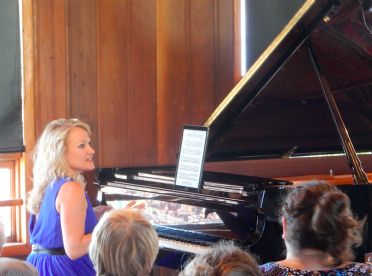|
Symphony
SRS SEASON ENDS WITH RESOUNDING TA-TA-TA-BANG
by Terry McNeill
Sunday, June 1, 2025
Symphony
YOUTHFUL VIRTUOSITY ON DISPLAY AT USO'S MAY CONCERTS
by Peter Lert
Saturday, May 17, 2025
Symphony
MYSTICAL PLANETS AND LIVELY GERSHWIN ORTIZ AT FINAL SRS CONCERT
by Peter Lert
Sunday, May 4, 2025
Symphony
VSO'S CONCERT MUSIC OF TIME, MUSIC OF PLACE
by Peter Lert
Sunday, April 27, 2025
Choral and Vocal
VOCAL ELEGANCE AND FIRE AT THE 222'S RECITAL APRIL 26
by Pamela Hicks Gailey
Saturday, April 26, 2025
CANTIAMO SONOMA SINGS AN INSPIRED GOOD FRIDAY MOZART REQUIEM CONCERT
by Pamela Hicks Gailey
Friday, April 18, 2025
DRAMATIC SHOSTAKOVICH SYMPHONY CLOSES PHILHARMONIC'S 25TH SEASON
by Terry McNeill
Sunday, April 13, 2025
LARGE COLLEGE OF MARIN AUDIENCE GREETS STOPHER ARTISTRY
by Terry McNeill
Saturday, April 5, 2025
Chamber
FRISSON DELIVERS SHIVERS OF DELIGHT
by Abby Wasserman
Sunday, March 30, 2025
OLD AND MOSTLY NEW IN SRS MARCH CONCERT IN WEILL
by Peter Lert
Saturday, March 22, 2025
|
 |
 Pianist Molly Morkoski July 22 in Preston Hall |
ADAMS' PHRYGIAN GATES HIGHLIGHTS MORKOSKI FESTIVAL PERFORMANCE
by
Saturday, July 22, 2017
Attendees at the Molly Morkoski Mendocino Music Festival recital July 22 were in for a treat, both pianistically and if they happened to buy a tasty cookie during intermission. The program included Beethovenís Op. 27 Moonlight Sonata, Adamsí Phrygian Gates, a surprise add-on of Griegís Holberg Suite, and closed with Chopinís F Minor Ballade. If the event had been a horse race the audience would have been jumping to their feet with excitation at certain moments and ripping up their betting receipts at others. But thatís how great racehorses are; their unpredictability makes them exciting, but also makes the slightest stumble nearly heartbreaking. And so it was at this concert before a Preston Hall audience of 150.
Ms. Morkoski was slow out of the gate with the C-Sharp Minor Sonata, and rendered a journeyman interpretation without much nuance. The triplets of the first movement sounded a bit plodding, as the artist kept reminding the audience of the beginning of each triplet with a heavy thumb. The second movement improved with good phrasing and moderate pace. The artist had explained to the audience in brief pre performance comments that the piece picked up steam from movement to movement with the third and final movement to be performed at a brisk pace. And so it was with her performance, except that as a consequence it was hard not to find the third movement more than a bit rushed. While in this and the pieces to come Ms. Morkoski demonstrated ample pianistic technique, her musicality at times seemed to suffer as a result. This burst of speed so early in the ďraceĒ may have been an unwise expenditure of energy without pianistic result and may have tired her by the concertís finishing chords.
It was with the Phrygian Gates where Ms. Morkoskiís interpretation shined. It was clear from the start that she had applied her interpretive skills to fashion a performance that showed the grand arc of the 27-minute piece. Despite its constant repetitive notes, the piece is compelling and holds the listenerís rapt attention. The playing here was superb with contrasting dynamics and extended phrasing that few performers are able to project to a pulsating effect. It is also a piece that requires pianistic endurance. The afternoonís performance could not have been better. It was electrifying and was clear with the Adams, written in 1978, that she had really reached her stride.
After intermission Griegís Holberg Suite, Op. 40, was a charming add-on. Ms. Morkoski planned the concert without an intermission and so had not included it, and told the audience that given there was an intermission she wanted to be sure they would come back with the addition of the Grieg piece, written in 1884. No enticement was necessary and the audience was given a special treat. Here Ms. Morkoski seemed to take a breath and pace herself as if on the back race straightaway holding her position, taking time for trills and couplets and careful articulation, even in faster passages. Originally written as a piano piece but popularized as a work for string orchestra, the Suite of five dances offers beautiful melodies combined with signature Grieg harmonies. The piece was actually written to be in Baroque style and Ms. Morkoskiís playing made one feel as if they had traveled back in time to a less rushed and more contemplative era. The sellout audience provided boisterous applause.
The closing Chopin Ballade in F Minor, Op. 52, got off to a false start. After debating whether to play from memory or use a score, the pianist decided to play from memory but soon faltered. She stopped, commented that she was tired, and started the piece over with the score. However, for whatever reason, fatigue or otherwise, the playing of the Chopin was uninspiring. The Fourth Ballade is one of Chopinís greatest works for piano, not as technically challenging as the 27 Etudes but full of communicative challenges that require a quiet energy that underpins the strong emotional content. Here Ms. Murkowski seemed to simply run out gas as she quietly crossed the musical finish line with nothing more to give.
On another day she might have finished with more security, but there was no doubt that she is a serious artist and impressive in selected repertoire. No encore was offered to the appreciative audience.
|

